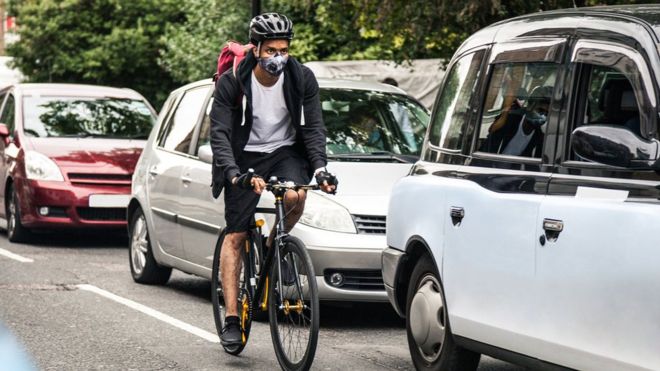
New diesel and petrol vehicles to be banned from 2040 in UK
New diesel and petrol cars and vans will be banned in the UK from 2040 in a bid to tackle air pollution, the government is set to announce.
Advertisement
Ministers will also unveil a £255m fund to help councils tackle emissions from diesel vehicles, as part of a £3bn package of spending on air quality.
The government will later publish its clean air strategy, favouring electric cars, before a High Court deadline.
Campaigners said the measures were promising, but more detail was needed.
They had wanted government-funded and mandated clean air zones, with charges for the most-polluting vehicles to enter areas with high pollution, included in the plans.
After a protracted legal battle, the government was ordered by the courts to produce new plans to tackle illegal levels of harmful pollutant nitrogen dioxide.
Judges agreed with environmental campaigners that previous plans were insufficient to meet EU pollution limits.
Ministers had to set out their draft clean air strategy plans in May, with the final measures due by 31 July.
Charging plans?
Environment Secretary Michael Gove said the government would give more than £200m to local authorities to draw up plans to tackle particular roads with high pollution.
"What we're saying to local authorities is come up with an imaginative solution to these proposals," he told the Today programme.
Asked if there could be charges for drivers of certain vehicles he said: "I don't believe that it is necessary... but we will work with local authorities in order to determine what the best approach is."
Local measures could include altering buses and other transport to make them cleaner, changing road layouts, altering features such as speed humps, and re-programming traffic lights to make vehicle-flow smoother.
It is thought ministers will consult on a scrappage scheme later this year, but there is no firm commitment.
Industry interests
Ministers have been wary of being seen to "punish" drivers of diesel cars, who, they argue, bought the vehicles after being encouraged to by the last Labour government because they produced lower carbon emissions.
The industry trade body, the Society of Motor Manufacturers and Traders, said it was important to avoid outright bans on diesels, which would hurt the sector.
SMMT chief executive Mike Hawes said demand for alternatively fuelled vehicles was growing but still at a very low level.
"The industry instead wants a positive approach which gives consumers incentives to purchase these cars. We could undermine the UK's successful automotive sector if we don't allow enough time for the industry to adjust."
The AA said significant investment would be needed to install charging points across the country and warned the National Grid would come under pressure with a mass switch-on of recharging after the rush hour.
The UK announcement comes amid signs of an accelerating shift towards electric cars instead of petrol and diesel ones, at home and abroad:
Air pollution is thought to be linked to about 40,000 premature deaths a year in the UK, and transport also contributes to greenhouse gas emissions.
A government spokesman said poor air quality was "the biggest environmental risk" to public health in the UK.
2020s switch-over
The measures are "good" in the long term but "not very effective" in the short, industry expert David Bailey said.
A switch-over to electric cars would likely come in the mid-2020s, he predicted, when electric cars would out-compete petrol and diesel ones on factors like cost.
"This sets a very clear direction of travel, but petrol and diesel cars won't exist by 2040," he said.
He said more incentives were needed now, otherwise urban air quality would not improve.
Emissions hotspots
Environmental law firm ClientEarth welcomed the measures, but said it wanted to see more detail.
Chief executive James Thornton said the law found ministers must bring down illegal levels of air pollution as soon as possible.
Green Party MP Caroline Lucas welcomed a ban but said it did not go "nearly far enough or fast enough".
Friends of the Earth said the plan was a "cynical" move which passed the buck of saving lives to local authorities.
Labour said the government was only acting after being taken to court.
Environment, Food and Rural Affairs spokeswoman Sue Hayman MP said the government had a "squeamish" attitude to clear air zones, and was shunting the problem on to local authorities.
"With nearly 40 million people living in areas with illegal levels of air pollution, action is needed now, not in 23 years' time," she said.



